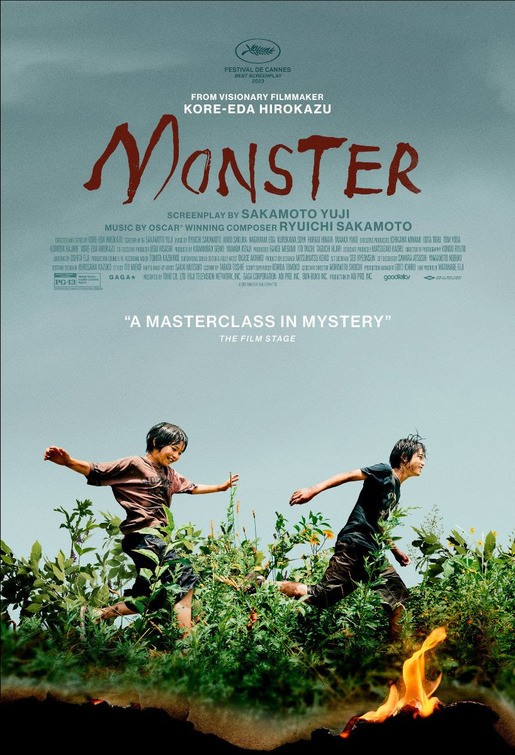Monster
Introduction
The first weekend of the new year 2024 has been a quiet one in terms of the number of new releases. This in a way was a good thing given that it allowed me time to invest in some of the gems that I may have missed in 2023. With that, I finished watching the much talked about Japanese film Monster which is directed by Hirokazu Kore-eda. And for the lovers of world cinema, Kore-eda is not an unknown entity. He has been a prolific filmmaker who often doesn’t exaggerate his world while preferring to keep it subtle. Yet it is the underlying emotions that are used to fuel the narrative ahead, be it in Shoplifters or Broker. Each character of the film is often broken in his/her own capacity while stimulating a fixed emotion that collectively contributes as an undying undercurrent. And while Monster had premiered at MAMI late last year, I happened to miss it and since then I had been hearing a lot of good things about it. So when I did get to know about its digital premiere, I sprang from my seat and watched it at my first opportunity. So then does Monster manage to impress, let’s find out.
Story & Screenplay
Monster follows the story of a single mother who notices her son behaving strangely, thus giving an impression that something is off. And while she suspects the school and the teachers for the same, the story paints a different picture through perspectives that often keep changing. The story here is another tribute to Roshomon with a string of events unfolding through different perspectives. But the major difference in narrative styles is that while Roshomon complicated the screenplay(deliberately) through its different perspectives, Monster simplifies it with its ever-changing gaze of human emotions and the immediate judgment. The screenplay standing at just about 2 hours is quite honestly a screenplay writing masterclass that coaxes the viewers to feel for the characters in a manner before frequently changing the point of views. The end picture though tells a totally different story. (Spoilers ahead!)
The drama begins with the camera focusing on the feet of a boy as he makes his way to his home. The writers lace the backdrop with a fire that has taken place at a bar, an event which would be repeated thrice over the course of the narrative. You are uncannily introduced to the character of a single mother who is almost immediately posed a question by her 11 year old boy on whether humans have ‘pig’s brain’. As odd as the question were to sound, was in fact just the beginning as the mother observes strange behaviorial patterns in the life of her child right from him chopping his hair, to jumping off a moving car to suddenly disappearing from her place and only to be found in an abandoned cave while shouting – ‘Who is the real monster’. Suspecting foul play, she approaches the school while specifically asking for a teacher whom she thinks is the root cause of her son’s issues.
The proceedings are engrossing and often unfolding from three perspectives – the mother, the teacher and the 11 year old son. The mother is a sharp woman who instantly notices the change in behavior of her son that also denotes how caring she would be in normal life. Yet, yje hollowness of her relationship can be attributed to a lack of a spouse while having formed a strong judgment about a teacher in school. She almost utters the words on whether there are any humans available in school owing to the lack of emotions that the school authorities showcase including the school principal who we are told had lost her grandchild. The impression being setup is of a potential abuse committed by a teacher who is shown to be a little creepy. This was also a subtle commentary of the classroom politics with the students often being subjected to offensive behavior by people in charge. But a sudden change in the perspective reflects a different picture.
The change in the POV suggests that the young teacher of the 11 year old boy is gentle and understanding while subtly resorting to patriarchy. An important sequence includes telling the boys of his class to stop crying by saying that ‘Real Men Don’t Cry’. This was more to do with the loneliness of him as a person who was constantly searching for love despite having a woman that he loved(though the reciprocation wasn’t clearly established). So your perception about a character completely takes a U-Turn while adding to the mystery around the version of the young boy.
When the perspective changes for the final time, you are witness to the character of the young boy who is a recluse and lost in his own thoughts. He is a loner with no friends until he befriends a boy from his class. And from this point on, the picture becomes clearer. The concept of sexuality in kids is a very sensitive topic in itself, something that was beautifully explored in the 2022 film Close. Here too, the budding relationship was hinted at subtly, without laying out facts on the table. It was almost implied by the prolific filmmaker whose treatment was so soft and gentle. And along the way, you do get to explore the dynamics of their relationship by going through the set of events again while also touching upon a topic like child abuse.
It is heartbreaking to witness their relationship, particularly because of both being trapped in the weight of their identity and the baggage imposed on them by the society, thus resulting in bouts of frustration and anxiety oblivious to the adults around them. In a heartbreaking scene, you see the 11 year old admitting to the same yo his Principal who also reveals a secret reflective of her mental state and the loss that she was going through. Elsewhere, the little boy(friend of the 11 year old) prefers to be beaten by his father while admitting that he had lied about him liking a girl. And of it put together ends in a tragic end that leaves you hollow. In the final shot, you see the two boys running free with sun shining, a setting in contrast to the typhoon that had resulted in the characters of the mother and teacher searching for the 11 year old. The typhoon denotes the real world filled with turmoil and pain while the sunshine is representative of an alternate universe where life is different and so is the concept of love free from the chains of the conditions. Yes, the two boys were dead, happy in their new world but letdown by the society of the current world. The screenplay was quite honestly a writing masterclass of the highest order.
Dialogues, Music & Direction
The dialogues are subtle and only subjected to aide the narrative ahead while helping to form opinions. The music is just so soothing and melancholic at the same time. Composed by Ryuichi Sakamoto in his final work having expired a couple of months before the release of the film, the drama paid perfect homage to his craft at the end. The cinematography captured some brilliant frames that were heartbreaking and heartfelt in equal measures. The editing is excellent and allows the drama to flow like a river despite the multiple perspectives in play. Director Hirokazu Kore-eda is a master of emotions while always keeping them understated. Here too, the emotions are subtle while being subconsciously accumulated as an undercurrent, only to pave way in a rather tragic ending that did leave me heartbroken. The direction was magnificent in truest sense of the word.
Performances
The performances are simply outstanding here. Yuko Tanaka as Makiko expresses her pain so beautifully in a character that had a limited screen time. Hinata Hiiragi as Yori is adorable in a character who is always smiling despite carrying a mountain of pain within him. Eita Nagayama as Hori is wonderfully understated in a phenomenal job done. Sakura Ando as Saori is pretty layered as a character particularly with the relationship that she shares with her son. And she was simply terrific as a doting mother who eventually fails to recognize the issue that her son has been going through. Soya Kurokawa as Minato is outstanding to the core as a character suffering from depression related to his identity. His stoic expressions are backed with a volcano of emotions that he presents very gently with occasional bouts of anger. He was terrific to witness onscreen.
Conclusion
Monster is an absorbing drama of shifting perspectives in a screenplay writing masterclass, a drama that is highly recommended from my end.




